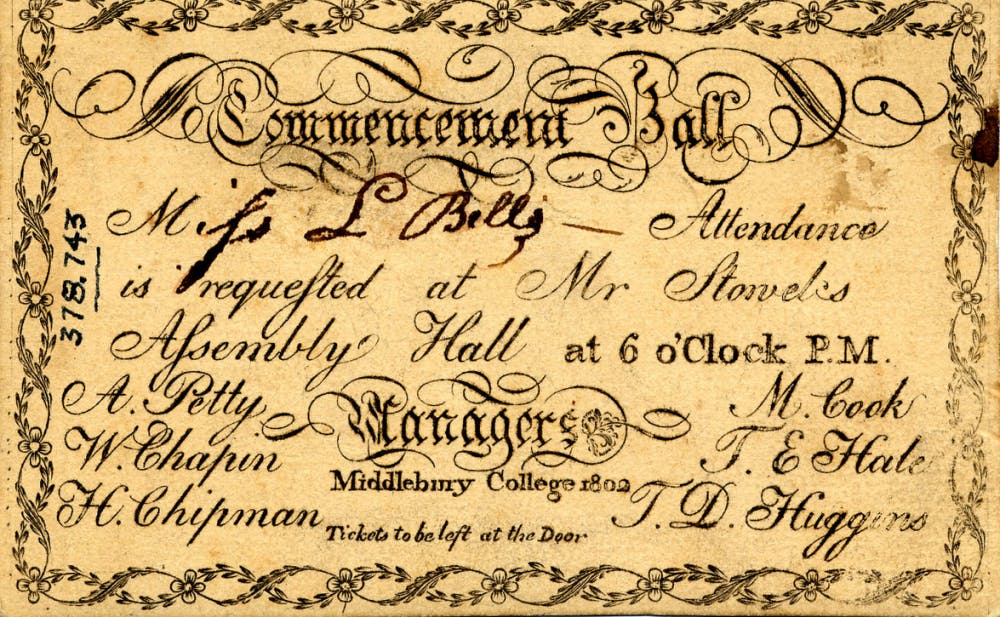Aaron Petty ’02 missed his own graduation. A few weeks before the ceremony, he contracted tuberculosis; by the day of graduation, he was bedridden. As the valedictorian of his class, he was scheduled to give a speech entitled “On the Existence of God” to close out the ceremony. That speech, sadly, was never delivered, leaving a significant gap in the program. His absence was especially awkward, though, because Petty was the only person set to graduate that day.
Middlebury’s first graduating class, the class of 1802, consisted of one person. That person was Aaron Petty. A shoemaker by trade, Petty wanted an education so that he could become a minister. He entered the college as a junior in 1800, the year Middlebury was founded, and split his time between shoemaking and school to pay for his classes.
Graduation in Petty’s time was a rather solemn affair. Considering the ceremony included 24 speeches over the course of 24 hours (two orations in Latin, two orations in Greek, three declamations, two colloquies, three dialogues, three disputes and nine orations in English, plus four sets of sacred music and two sets of instrumental music), you could argue that Petty was lucky to have fallen ill when he did. If modern graduation ceremonies are a bit of a snooze, this must have been an excruciating puritanical night terror.
Despite the ceremony’s inexcusable dreariness, though, Petty must have been pretty disappointed to miss it. He was known “for his ambition to advance himself in life,” according to historian David Stameshkin, and he hoped that an education would provide the bootstraps with which to pull himself out of … well, boot-making. After two years of hard work and many pairs of shoes, Petty was expecting to have a ceremony to honor all that hard work — graduation was, quite literally, his day. But, for reasons out of his control, he had to celebrate commencement from his bedroom.
Petty’s story seems especially relevant this year, when, once again, the entire senior class will miss graduation due to illness. We will observe commencement, at least for now, from our respective bedrooms.
Two hundred and twenty years later, an old Middlebury tradition has found new life.
Like the Panther Parade, this is not a tradition anyone had really hoped would continue. Nobody wants to fear for their health. And nobody wants to miss graduation, except maybe for younger siblings.
Just as Petty did in 1802, we want recognition of our efforts. And rightfully so! The multiplicity of experiences and challenges that the members of our class have lived through over the last four years (and the last four weeks) should be honored, publicly. Every person has their own reasons for feeling a sense of accomplishment this May, and to suddenly lose the recognition of that accomplishment is like finishing a marathon only to find there was no one watching the race.
There’s no sugar-coating it: losing graduation sucks. (Losing Senior Week sucks, too, but for slightly more Dionysian reasons.) It sucks for us, it sucks for our families, it sucks for local businesses, and it sucks especially for the hungry campus squirrels.

Yet amid all that suckiness, there are also reasons to rejoice. Recently, I’ve found myself turning to a favorite poet of our generation, who says, “Ain't about how fast I get there, ain't about what's waitin’ on the other side … it's the climb.” Miley Cyrus’s corporate-spawned clichés hit home for a reason: it is about the climb, and that’s especially true for college.
Whether there is a ceremony or not, nothing about the four (well, three and three-quarters) years we spent at Middlebury will change. We still filled our brains with useful information and economics; we still formed beautiful, lasting friendships; we still figured out that Atwater is not the place to find love; and we still leave Middlebury with memories of immense happiness, with the scars of immense stress, and, most importantly, with a whole lot of love. We will also hopefully still leave with one of those weird old-timey canes.
In loss, we have been granted clearer vision of what we have been given. And we’ve been given so much.
Six months after graduating from his bed, Aaron Petty died. He had never recovered from the tuberculosis that had forced him to miss commencement. Thus the class of 1802, half a year after leaving Middlebury, ceased to exist.
Unless I’m horribly mistaken, the class of 2020 has a much brighter future ahead of it. Whatever may happen in the coming months, and whenever we hold our eventual physical graduation, that future — our future — is something to have faith in.
Will O’Neal is a member of the class of 2020.
Missing graduation is a Middlebury tradition

The invitation to the 1802 Commencement Ball from Special Collections.
Comments



